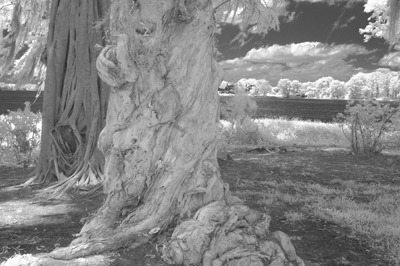 I’m with my family on an isolated stretch of the Metolius River in Oregon. Lush vegetation clings to the bank, ferns and clover and elephant grass, willow trees and aspens, but the air hangs hot and dry. Insects burr. A woodpecker taps like a slow metronome. This is before my parents’ divorce, so we’re all there—my father, my mother, my three younger brothers, and our Dalmatian, Sparky. We’ve hiked in, and now we sit together drinking strawberry sodas and eating cold fried chicken from a paper sack and marveling at the dog, who wades in the shallows. We’ve lost tennis balls in lakes trying to goad him to swim, yet here he is today, high-stepping, sniffing the surface, pausing now and then to drink. My brothers keep complaining he’s too close to the dangerous part of the river, and Dad keeps responding that Sparky knows what he’s doing, that dogs have instincts.
I’m with my family on an isolated stretch of the Metolius River in Oregon. Lush vegetation clings to the bank, ferns and clover and elephant grass, willow trees and aspens, but the air hangs hot and dry. Insects burr. A woodpecker taps like a slow metronome. This is before my parents’ divorce, so we’re all there—my father, my mother, my three younger brothers, and our Dalmatian, Sparky. We’ve hiked in, and now we sit together drinking strawberry sodas and eating cold fried chicken from a paper sack and marveling at the dog, who wades in the shallows. We’ve lost tennis balls in lakes trying to goad him to swim, yet here he is today, high-stepping, sniffing the surface, pausing now and then to drink. My brothers keep complaining he’s too close to the dangerous part of the river, and Dad keeps responding that Sparky knows what he’s doing, that dogs have instincts.
The river is shallow and dark at the edge, where there’s a rock shelf, and at the center the shelf drops into a swift channel as startlingly blue as my father’s eyes. It’s the pale blue of the channel I’ll remember best, the force of the water there, its depth and danger. Mom has warned that its current can yank and swallow us. She used to say the same thing about the undertow at a California beach we liked. I knew an undertow took you down, but whenever I pictured getting caught in it, I imagined myself borne along the ocean’s surface, watching my family pick shells and pieces of jade from the pebbles on shore, receding. It was a fantasy I could afford only because it was false—I knew I would cry out if it happened, and that my father would charge in and pluck me from the water’s clench.
But I’m twelve now, and recently I’ve started to doubt my parents’ abilities, their authority. They aren’t gods anymore. I understand that my father can’t outmuscle an undertow, and activities that would horrify my mother are often thrilling—small acts of vandalism, theft, mischief. So I understand the legitimacy of the river’s threat, but it doesn’t prevent me from tightening my Tevas and shuffling toward the channel, icy water biting my ankles and shins. I stop when I feel the current’s pull, feel my tread grip the toothy rock. I look into the blue abyss. Translucent bubbles swirl and shoot downstream. I picture myself sucked into its depths and sense the burning fear and confusion, the struggle against suffocation, the sudden prospect of death.
I’m returning to shore when I hear the splash. It’s a thump, a gulp. My brothers burst into panic, point, jump, terror in their voices as they call, “Sparky!”
I turn to the channel. Sparky’s spotted head bobs in the blue water, fur matted, wet, bright with sunshine, front paws clubbing the water as he moves downriver. Panic blossoms inside me, because I’ve felt the current’s power, and I know we will witness a drowning.
“John,” Mom says, a command.
Dad is in his early forties at this point, an entrepreneur with a trimmed mustache and soft shoulder muscles, the type of man I’d expect to comb his hair before responding to an emergency, or to pick his way along the river’s shelf slowly, wincing at the jagged footing. But he is without hesitation. He charges through the shallows, bare-chested, barefoot, spraying sheets of water, his stride smooth and certain as he chases the dog downriver. He veers toward the underwater ledge, where the dark water ripples and eddies beside the swift channel, and in one motion he kneels and reaches into the blue void and hoists Sparky by the neck and flings him onto the shelf.
Sparky trots back to shore. He shakes himself dry, then blinks calmly in the hot sunshine, panting, the corners of his mouth curled like a smile, pink tongue dangling.
In the river, my father rises.
“You’re bleeding,” Mom says.
He looks down. A bright red trickle runs from his wet knee. “Damn dog,” he says, and begins picking his way to shore, where we wait for him, gaping.
—
J.T. Bushnell teaches writing and literature at Oregon State University and lives in Corvallis. His work has appeared inThe Mississippi Review, The South Carolina Review, The Tusculum Review, and Brevity‘s Fall 2008 issue, and it is forthcoming in The Greensboro Review, Natural Bridge, and Meridian. He is currently working on a collection of stories and a novel.
Photo by Pamela Z. Daum
